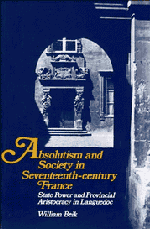 Absolutism and Society in Seventeenth-Century France
Absolutism and Society in Seventeenth-Century France Book contents
- Frontmatter
- Contents
- List of tables
- List of figures
- Preface
- List of abbreviations
- Map: Languedoc in the seventeenth century
- PART ONE INTRODUCTION
- PART TWO THE DISTRIBUTION OF AUTHORITY
- PART THREE THE PROVINCE ON ITS OWN
- PART FOUR THE PROVINCE AND THE CROWN
- 10 Channels of personal influence
- 11 Tax flows and society
- 12 Collaborating with the king: positive results and fulfilled ambitions
- 13 Basking in the sun: the triumph of authority and hierarchy
- Conclusion
- Appendix: Breakdown of taxes from the diocese of Toulouse, 1677
- Select bibliography
- Index
10 - Channels of personal influence
Published online by Cambridge University Press: 05 July 2011
- Frontmatter
- Contents
- List of tables
- List of figures
- Preface
- List of abbreviations
- Map: Languedoc in the seventeenth century
- PART ONE INTRODUCTION
- PART TWO THE DISTRIBUTION OF AUTHORITY
- PART THREE THE PROVINCE ON ITS OWN
- PART FOUR THE PROVINCE AND THE CROWN
- 10 Channels of personal influence
- 11 Tax flows and society
- 12 Collaborating with the king: positive results and fulfilled ambitions
- 13 Basking in the sun: the triumph of authority and hierarchy
- Conclusion
- Appendix: Breakdown of taxes from the diocese of Toulouse, 1677
- Select bibliography
- Index
Summary
The broader configurations of provincial politics do not completely explain the splits within companies or the factionalism and rivalry which characterized our period. There was another dimension to political activity – the hidden play of personal connections – which was also important and which needs to be explored further. Authority under absolutism was diffuse and very personal. Family ties, corporate pressure groups, and client systems were all central to the functioning of the early modern state, but exactly what the relationship was between these forces and political action is often difficult to determine. This chapter explores that relationship, using the available genealogical information and the vast number of references to personal ties in the sources. The idea is to start with what can be learned of personal relationships and look from there for connections which may illuminate the political activities already discovered. I should stress that the emphasis here is not on the nature of the patron–client bond, which is a subject in itself, but on the implications of such bonds for provincial politics.
THE IMPORTANCE OF PERSONAL INFLUENCE
One fascinating thing about seventeenth-century government was the way institutional processes and personal networks intermingled and influenced each other. Government was articulated first through royal institutions, but while institutional channels were established firmly enough that they deflected and modified the nature of personal influence, personal forms of power, which were themselves evolving, still played a central role in the decision-making process.
- Type
- Chapter
- Information
- Absolutism and Society in Seventeenth-Century FranceState Power and Provincial Aristocracy in Languedoc, pp. 223 - 244Publisher: Cambridge University PressPrint publication year: 1985
